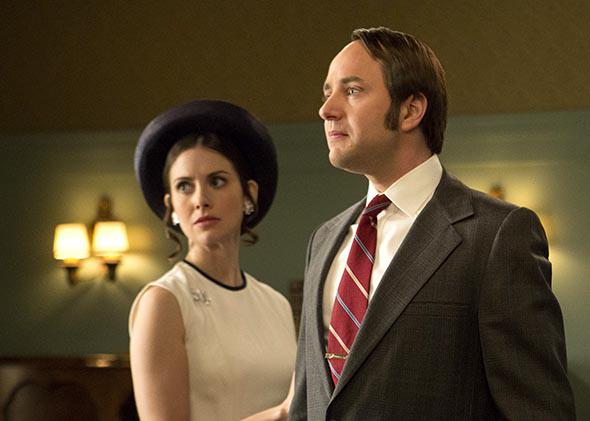John, Julia,
Do either of you watch Silicon Valley? Although these two shows could not be more tonally different—juvenile comedy schtick set in the ever-present vs. mannered though sometimes very funny period drama—there have nonetheless been a handful of alarmingly parallel plot developments this season. (Which, come to think of it, may explain why, when I hear Meredith’s voice on Don’s answering machine, she reminds me of Siri). For example, this week, the lovable morons of Pied Piper had to hustle, yet again, to avoid being absorbed by the tech giant Hooli. In their case it worked, thanks to the last-minute intervention of an asshole-ex-machina billionaire. In SC&P’s case, it didn’t, and thank God, not because I don’t admire the renegade spirit, but because in this final season, we need to move to that last phase, where all the deepest Weinerian truths are revealed.
“Who wants me?” Peggy brightly asked the headhunter, when the beautiful message of this episode is that she already knows the answer. Stan, Don, Roger, Joan—her makeshift family at the office wants her. John, that scene when she asked Stan just to stay on the phone was perhaps my favorite Mad Men touch ever. The silence between them was nothing, and everything, the love that fills the space when she stops all her brisk, off-putting “I have to get back to work” style of talking. The kind of revelation that happens only when everyone stops pulling files and calling clients and making noise and realizes where they actually are in life.
Julia, I loved your point about how the shift from cocktails to beer must mean the end of something. (Or the “beginning of something. Not the end,” as Don lamely says). But the beginning and end of what? I read into the show a note of wistfulness about aging. Accepting that you are no longer the underdog usually means accepting that you are no longer young. Roger muses that the Sterling line has come to an end but at least he finally has an age-appropriate lover (even if she is crazy). Ted’s not going to parties anymore but has found someone “not too young” and a “little bit deep.” Trudy worries that in 10 years everyone will leave her alone, and Pete, unusually gallant this episode, comforts her that she’s “ageless.” As for Joan—you’re right, Julia, that she’s been all too conveniently rescued by a charming Frank Sinatra lookalike. But it’s hard to imagine her giving it all up and falling into his arms. I more imagine her leaving the firm and concocting some perfumed cold cream that brings her Estee Lauder–like fame and millions. (As the Dean Martin outro song goes, “How I wish I had millions and nothing to do.”)
Of course, when they leave the bar, the only person who has nowhere to go is Don. Over on Indiewire, Sam Adams pointed out that Mad Men ended the last four episodes in virtually the same way, with Don standing alone, looking lost. This one didn’t end that way but made it clear that he has nowhere to go when he looks for Diana and finds she’s moved. Maybe that’s our clue that his future lies outside the firm. Whether he ever finds Diana or not, he’s searching for something wholly unconnected to the world he’s living in now.
There were hints, too, in this episode about the fate of future generations. Mad Men has rarely shown us instances of admirable parenting, and the stage mom’s showdown with Peggy was another example. Stan’s great line about the stapler incident—“How the hell did that turn into that?”—could also be the lament of a generation of self-involved parents comparing baby pictures with their actual adult children. I admire the show for letting Peggy mourn the child she gave away while letting her own the decision, although as always, I wish the writers had kept the National Organization for Women slogans out of her mouth (“A woman should be able to live her life, just like a man does!”).
I was intrigued by the “drawing a man” test that Trudy and Pete’s daughter apparently failed. It was a common test given in that era thought to be diagnostic of both schizophrenia and intelligence but soon proven largely bogus. I wondered if we were supposed to compare it to the “test” that SC&P passed and conclude that tests are generally meaningless. I also wondered why a child who draws a stick figure with a mustache and necktie isn’t considered deviously brilliant.
Sayonara, my friends. Enjoy the rest of your miserable life,
Hanna
